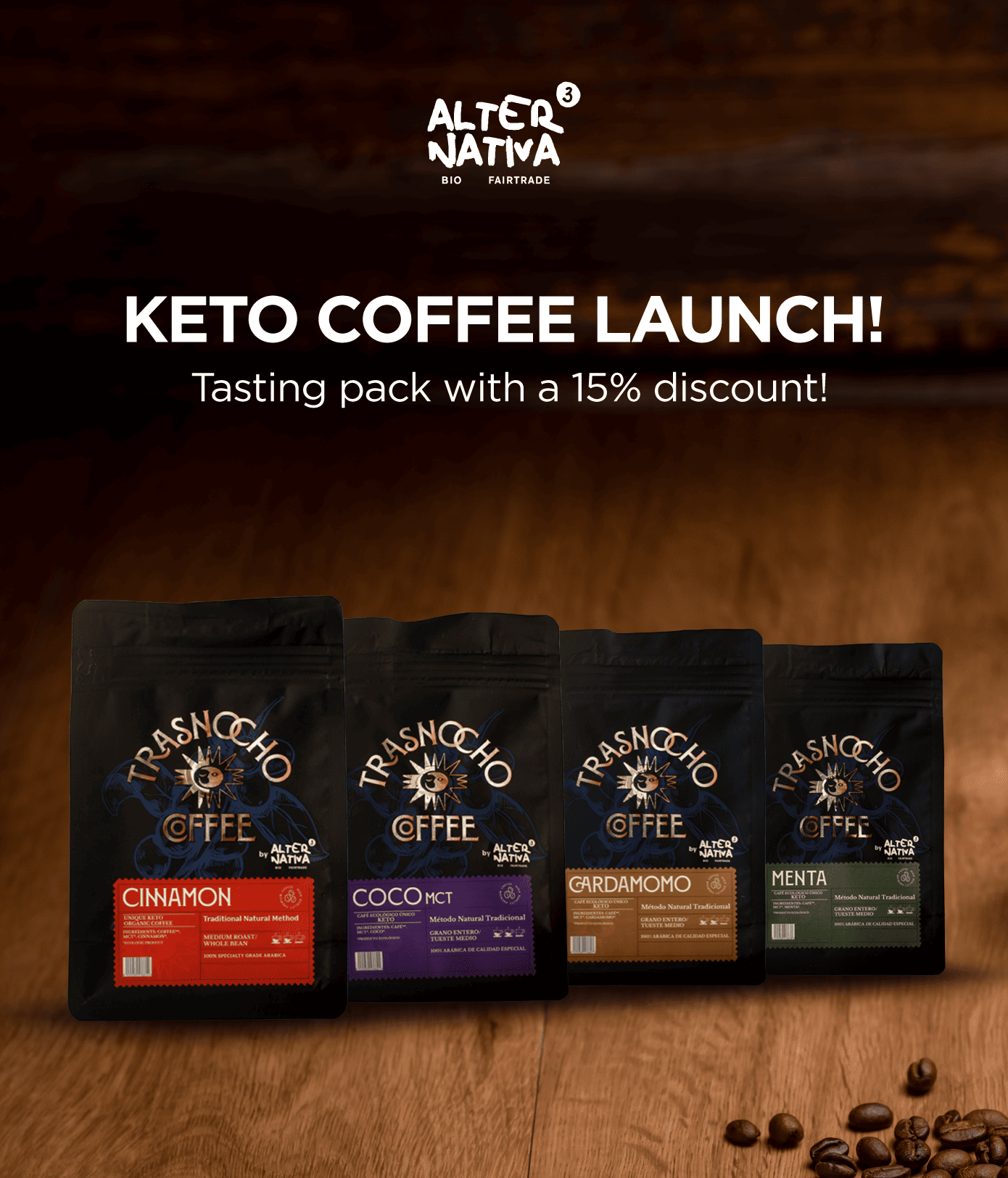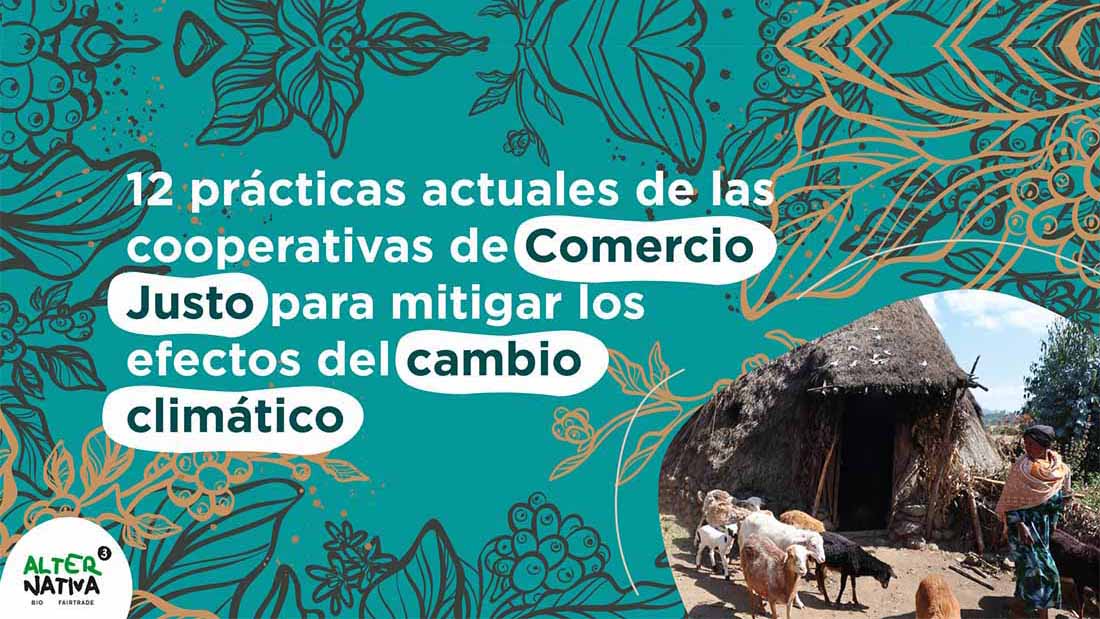At AlterNativa3 we are aware of the urgency of the need to implementing new consumption and production models in cooperatives. It is important to note that the emergency is not only environmental: conventional production practices intensify labour exploitation, poverty and inequality around the world.
Index
- Fair Trade practices against climate change
- 12 Fair Trade stories: transforming communities
- Food security in Burkina Faso
- Adaptation to climate change in Thailand
- Migratory beekeeping in Guatemala
- Grapes and climate change in Chile
- Rust-resistant coffee varieties in Peru
- Bananas and climate change in Colombia
- Climate change training in Nicaragua
- Advice on climate change and coffee in Nicaragua
- Sustainable mini-farms in Burkina Faso
- Women and village poultry farming in Burkina Faso
- Sugar cane and climate change in Costa Rica
- Sustainable and responsible quinoa in Bolivia
Fair Trade practices against climate change
This year we will share, in our 2024 calendar, twelve real-life examples of Fairtrade cooperatives working to mitigate the effects of climate change.
🙌🏻 Join us in the quest for a more sustainable and just future.
The reality of unsustainable consumption
In today's unbridled race of consumption and production, it is estimated that by 2050 we will need three planets to sustain our lifestyles.
This reveals the unsustainability of the current consumption model, aggravated by factors such as chemical soil degradation and water scarcity.
Climate challenge: the commitment of Fair Trade
We warn against the conventional model that favours large-scale production, with monocultures and maximisation of short-term yields.
This approach triggers negative impacts such as deforestation, desertification and biodiversity loss.
12 Fair Trade stories: transforming communities
At AlterNativa3 we believe in and practice Fair Trade and strive for environmental and social protection. That is why we strive, together with communities in various parts of the world, to make equitable, sustainable and coherent transformations in trade and agriculture a reality. These are twelve practices that exemplify this effort.
-
Food security in Burkina Faso
24 women in Burkina Faso are coping with droughts and floods due to climate change, while ensuring food security.
They organise assemblies, distribute tasks and lead sustainable projects, promoting training and land ownership for a more sustainable future. -
Adaptation to climate change in Thailand
In Yasothorn, Thailand, Fairtrade is driving a strong climate change adaptation programme. From awareness raising to loans, the community diversifies agriculture, strengthens its collective capacity and creates a dynamic learning network.
-
Migratory beekeeping in Guatemala
In Guatemala, migratory beekeeping moves hives to bee-friendly areas, with investments in reforestation and training to cope with climate change. Successes are shared in beekeeping committees and a dynamic network of learning and cooperation is being created.
-
Grapes and climate change in Chile
The Mi Fruta cooperative in Chile produces table grapes and is tackling climate change with strategic measures: soil improvement, technical strengthening and diversification.
Growers are also innovating with the use of solar energy to dry grapes, adapting resiliently to adverse conditions and ensuring productivity. -
Rust-resistant coffee varieties in Peru
Faced with the threat of the fatal coffee plant disease caused by climate change in Peruvian coffee cultivation, innovative strategies are being adopted.
These include the production of resistant coffee varieties, plant rejuvenation, optimised fertilisation, reforestation, weed control and climate monitoring. -
Bananas and climate change in Colombia
Climate change is affecting banana production in Colombia, with less rainfall and increased proliferation of pests. Several organisations are working on irrigation systems, water conservation and resource optimisation.
-
Climate change training in Nicaragua
The Comulacs cooperative provides customised training on leadership and climate change, with an emphasis on an improvement plan.
It also provides training in environmental responsibility for promoters and producer families, promoting sustainable and environmentally conscious practices. -
Advice on climate change and coffee in Nicaragua
Climate change challenges coffee farmers in Nicaragua. Fairtrade provides tailored technical advice to improve crops and ensure resilience to climate change, with tools for now and the future.
-
Sustainable mini-farms in Burkina Faso
In Burkina Faso, family mini-farms integrate agricultural and livestock techniques for a continuous cycle. With financial support, advice and equipment, the project strengthens women in the communities, improving their participation and raising the economic and health status of the family.
-
Women and village poultry farming in Burkina Faso
PPASA's support boosts village poultry farming in Burkina Faso, benefiting local women who generate income to cover family needs such as health and education. Integrated actions improve poultry health, habitats and marketing.
-
Sugar cane and climate change in Costa Rica
The Coopevictoria cooperative is facing increased pests, uncontrollable rains and erosion caused by climate change.
Through its activity, it reduces emissions, uses waste as organic fertiliser and protects water sources. It also promotes sustainable practices such as recycling vegetable oil for biodiesel. -
Sustainable and responsible quinoa in Bolivia
ANAPQUI (Asociación Nacional de Productores de Quinua) grows quinoa organically using natural processes.
Thanks to CLAC, women producers are trained in sustainable practices and climate change mitigation, which they pass on to new generations to secure their future.


